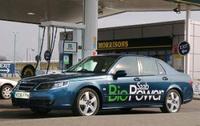Saab’s 9-5 2.3t BioPower goes on sale
 The Saab 9-5 2.3t BioPower cuts fossil CO2 emissions by up to 70 per cent whilst delivering maximum power of 210 bhp and 310 Nm of torque. That is 14 per cent more power and 11 per cent more torque when running on eco-friendly bioethanol E85 fuel compared to when running on petrol. Sounds too good to be true? Well it’s not – the Saab 9-5 2.3t BioPower goes on sale in the UK next week (Monday 20 November), with on-the-road (OTR) prices starting at £23,270.
The Saab 9-5 2.3t BioPower cuts fossil CO2 emissions by up to 70 per cent whilst delivering maximum power of 210 bhp and 310 Nm of torque. That is 14 per cent more power and 11 per cent more torque when running on eco-friendly bioethanol E85 fuel compared to when running on petrol. Sounds too good to be true? Well it’s not – the Saab 9-5 2.3t BioPower goes on sale in the UK next week (Monday 20 November), with on-the-road (OTR) prices starting at £23,270. Available in a choice of Saloon and Estate bodystyles with manual or automatic transmission, the 9-5 2.3t BioPower is also for sale in Ireland and Nordic markets, with other European countries to follow later this year. First unveiled at the British International Motor Show in July and offered in addition to the current 2.0t BioPower model which is already established as Sweden's best selling environmentally-friendly vehicle, the arrival of this new model further extends Saab's leadership of the premium 'flex-fuel' segment.
BioPower technology allows Saab cars to combine the benefits of 'going green' through substantially cutting fossil CO2 emissions, with the enjoyment of even sportier driving performance. A further practical advantage of the BioPower formula allows customers to run on petrol and/or bioethanol E85 fuel in any proportion without any adjustment needed by the driver.
Running on bioethanol E85 the new Saab 9-5 2.3t BioPower engine delivers its maximum power of 210 bhp and 310 Nm of torque, compared to 185 bhp and 280 Nm when using unleaded petrol. In terms of increased performance, the manual saloon accelerates from zero to 62 mph in 7.9 seconds, compared to 8.5 seconds when running only on petrol. Saab's powerful Trionic engine management system monitors fuel quality after every visit to the filling station and automatically makes any adjustments necessary for running on bioethanol E85 and/or petrol in any combination.
Bioethanol E85 has a much higher octane rating (107 RON in the UK) than standard unleaded petrol (95 RON), and turbocharging allows the use of a higher boost pressure and more advanced ignition timing – giving more engine power than is possible on petrol without risk of harmful 'knocking' or pre-detonation. The only hardware modifications necessary are more durable valves and valve seats and the use of bioethanol-compatible materials in the fuel system, including the tank, pump, lines and connectors.
Bioethanol fuel is produced commercially from agricultural crops, such as corn, grain, sugar beet and sugar cane. Unlike petrol, its consumption does not significantly raise atmospheric levels of carbon dioxide (CO2), which scientific research suggests is a major contributor to global warming. This is because emissions during driving are balanced by the amount of CO2 that is removed from the atmosphere when crops for conversion are grown.
“I have been delighted to see such an upsurge of interest in the UK’s emerging bioethanol industry during the course of 2006,” remarks Jonathan Nash, Managing Director of Saab Great Britain Limited. “Saab has been at the forefront of this movement right from the start, and now our efforts are beginning to pay off. We’re starting to see all of the pieces of the jigsaw come together at last; flex-fuel cars are appearing on UK roads, bioethanol E85 pumps are being installed at a growing number of supermarket petrol forecourts, factories which produce the ethanol are starting to be built, and UK farmers are starting to be paid to grow crops, instead of not to grow them!”

